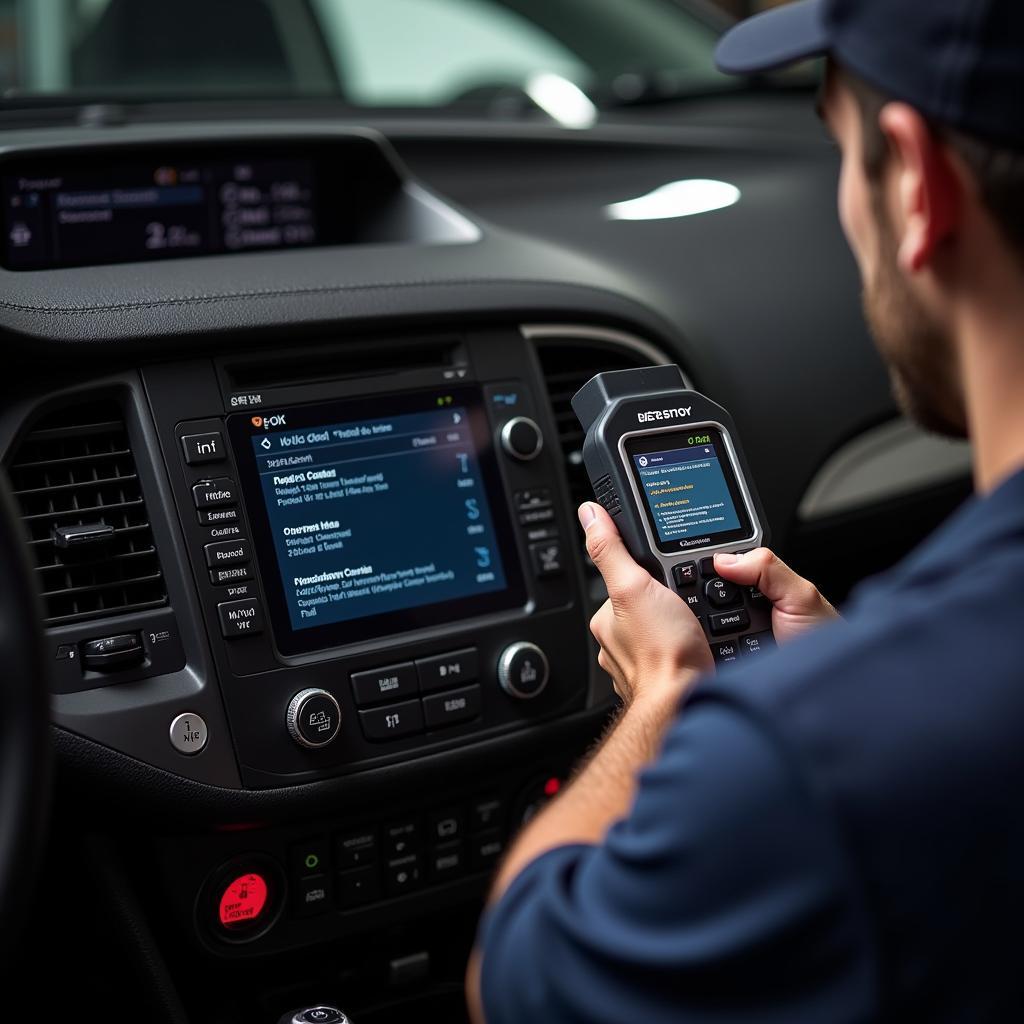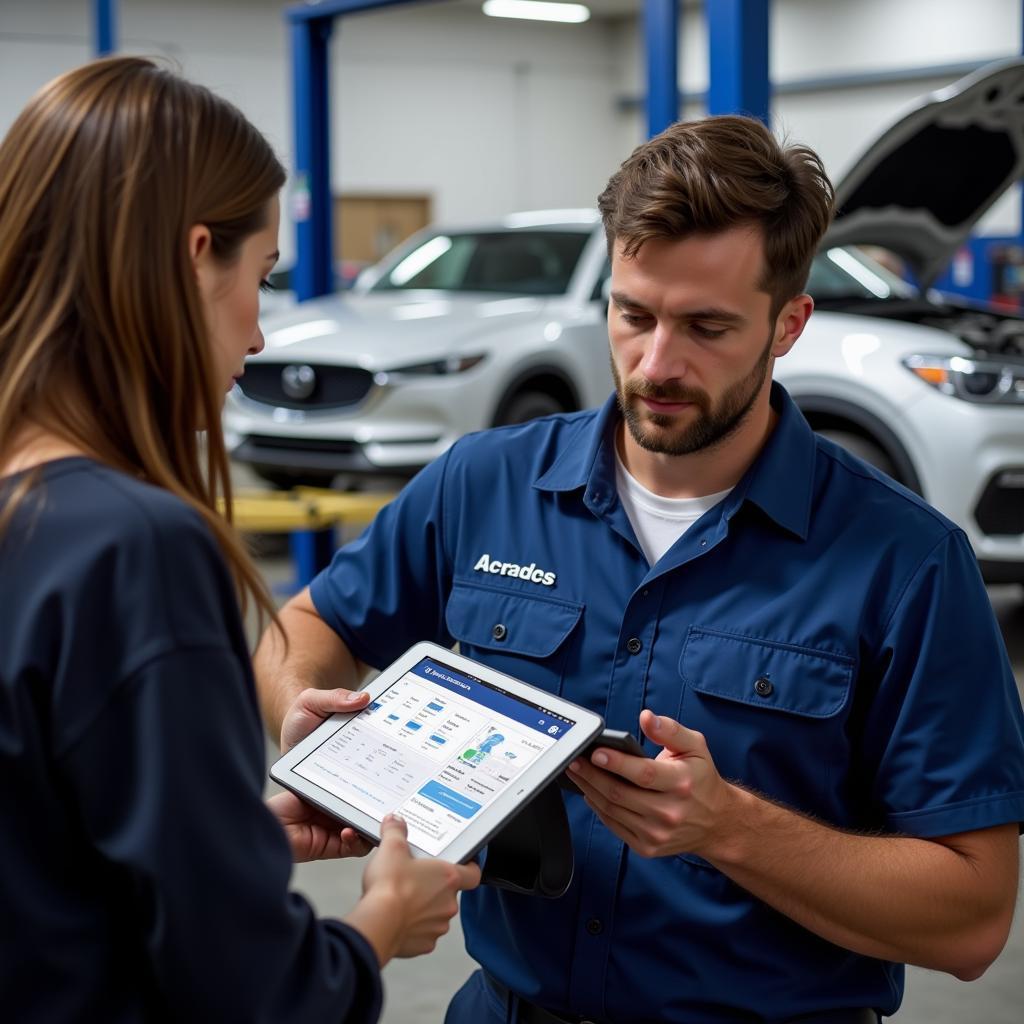Modern vehicles are intricate machines, relying on countless sensors and complex computer systems to ensure optimal performance and safety. When issues arise, pinpointing the root cause often requires more than a visual inspection. Enter “A To B Car Diagnostics,” a term encompassing the process of identifying and understanding problems within your vehicle’s electronic systems. This article serves as your comprehensive guide to car diagnostics, empowering you to make informed decisions about your vehicle’s maintenance and repair.
Understanding Car Diagnostics: Beyond the Check Engine Light
While the illuminated “check engine” light is often the catalyst for seeking car diagnostics, it’s crucial to recognize that this warning signal represents just a fraction of potential issues. Car diagnostics delve deeper, employing advanced scanners and software to communicate with your car’s computer, retrieving valuable data about its health and performance. This data can reveal:
- Engine performance issues (misfires, fuel/air imbalances, etc.)
- Transmission problems
- Brake system malfunctions
- Airbag system faults
- Issues with emissions control systems
- Electrical problems
 Car Diagnostic Scanner in Action
Car Diagnostic Scanner in Action
The Importance of Timely Car Diagnostics
Ignoring potential car problems is a recipe for disaster, leading to more severe damage and costlier repairs down the line. Timely car diagnostics offer numerous benefits:
- Early Problem Detection: Identifying issues early allows for swift resolution, often preventing minor problems from escalating into major headaches.
- Cost Savings: Addressing minor problems promptly can save you significant money on extensive repairs later.
- Improved Safety: Detecting and resolving issues related to brakes, airbags, and other safety-critical systems ensures your vehicle remains safe to drive.
- Enhanced Performance: Diagnosing and fixing performance-related issues can optimize your car’s fuel efficiency, power delivery, and overall drivability.
What to Expect During Car Diagnostics
A typical car diagnostic session involves the following steps:
- Connecting a Diagnostic Scanner: A qualified mechanic connects a specialized scanner to your car’s OBD-II port, usually located beneath the steering wheel.
- Retrieving Diagnostic Trouble Codes (DTCs): The scanner retrieves DTCs, which are standardized codes that correspond to specific problems detected by your car’s computer.
- Interpreting DTCs: Mechanics use their expertise, along with manufacturer databases and online resources, to accurately interpret DTCs and understand the nature of the problem.
- Further Investigation: In many cases, simply reading DTCs isn’t enough. Mechanics may need to conduct further tests, analyze live data streams from sensors, or visually inspect components to pinpoint the root cause.
- Developing a Repair Plan: Based on the diagnostic findings, mechanics develop a comprehensive repair plan, outlining the necessary repairs and associated costs.
 Mechanic Explaining Diagnostic Results to a Car Owner
Mechanic Explaining Diagnostic Results to a Car Owner
DIY vs. Professional Car Diagnostics: Weighing Your Options
While basic OBD-II scanners are readily available for DIY enthusiasts, it’s crucial to understand their limitations. These scanners can retrieve DTCs, but accurately interpreting them and diagnosing the root cause often requires the expertise of a trained mechanic. Here’s a comparison:
| Feature | DIY Diagnostics | Professional Diagnostics |
|---|---|---|
| Cost | Lower (scanner purchase) | Higher (labor and specialized equipment) |
| Convenience | Higher (can be done at home) | Lower (requires scheduling and travel) |
| Accuracy | Limited (depends on user knowledge) | Higher (mechanics possess expertise and resources) |
| Repair Capability | Limited (basic repairs) | Extensive (mechanics can address complex problems) |
Choosing the Right Car Diagnostics Service
Selecting a reputable and trustworthy car diagnostics service is crucial. Consider the following factors:
- Experience and Expertise: Opt for mechanics with extensive experience in car diagnostics, particularly with your vehicle’s make and model.
- Equipment and Technology: Ensure the facility uses up-to-date diagnostic equipment and software to ensure accurate and comprehensive results.
- Reputation and Reviews: Research online reviews and seek recommendations from trusted sources to gauge the service provider’s reputation.
- Transparency and Communication: Choose mechanics who communicate clearly and transparently, explaining the diagnostic findings and repair options in detail.
does a car service include diagnostics
A to B Car Diagnostics: Empowering Informed Decisions
“A to B car diagnostics” is not just about fixing a check engine light; it’s about understanding your vehicle’s health and making informed decisions about its maintenance and repair. By embracing timely diagnostics, choosing reputable service providers, and staying informed, you can keep your car running smoothly, safely, and reliably for miles to come.
FAQs about Car Diagnostics
1. How often should I get my car diagnosed?
While there’s no one-size-fits-all answer, most car manufacturers recommend an annual car diagnostic check as part of routine maintenance. However, if you notice any unusual symptoms or warning lights, it’s essential to schedule a diagnostic check immediately.
2. Can I drive my car with the check engine light on?
While driving short distances with the check engine light on might seem harmless, it’s crucial to understand the potential risks. Ignoring this warning could lead to further damage, potentially leaving you stranded and facing costly repairs.
3. Are car diagnostics covered under warranty?
Warranty coverage for car diagnostics varies depending on your vehicle’s manufacturer, warranty terms, and the specific problem. It’s best to consult your warranty documentation or contact your dealership for clarification.
4. How much do car diagnostics typically cost?
The cost of car diagnostics can vary depending on factors like your location, the service provider, and the complexity of the problem.
5. Can car diagnostics identify problems with my car’s battery?
Yes, car diagnostics can assess your car’s battery health by analyzing its voltage and charging system performance.
autotec scotland wheels and tyres engine diagnostics car repair
Need Help With Car Diagnostics?
If you’re experiencing car troubles or have questions about car diagnostics, our team of experts is here to help. Contact us via WhatsApp: +1(641)206-8880 or Email: [email protected]. We offer 24/7 customer support to address all your car diagnostic needs.

Leave a Reply